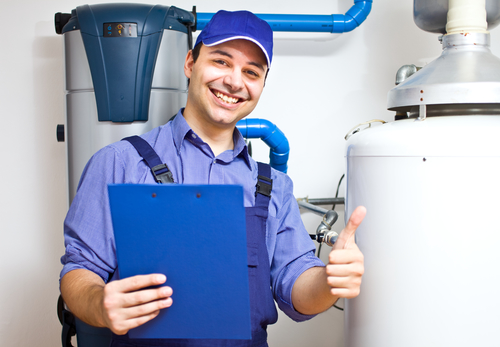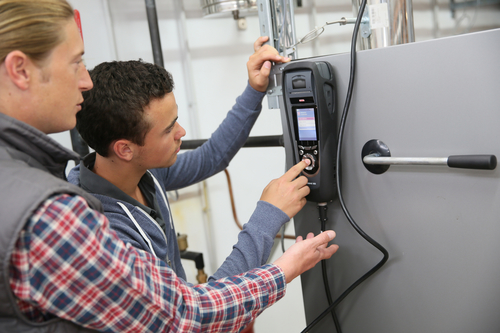The HVAC system has a critical role in ensuring that a building can perform its intended function in an effective and efficient manner. In main, this is because it provides the building with the heating and cooling needed to maintain a comfortable temperature regardless of outdoor conditions, which is one of the cornerstones of both health and happiness for the occupants. However, it should also be noted that excellent ventilation can make the air in the building much more breathable than otherwise possible, which can provide similar benefits to the same individuals. Based on these two factors, it is clear that a HVAC partnership with the right technician should be one of a building contractors’ top priorities.
HVAC Partnerships Are Worth It
However, providing a building with the best HVAC system possible is much easier said than done. First, there is the matter of calculating the building’s HVAC needs, which requires an understanding of its spaces as well as its expected use. Second, there is the matter of creating the HVAC system that is best-suited to the building owner’s needs and circumstances based on the components that are available to them, which requires an exhaustive understanding of both the customer and the market. Third, there is the matter of installing the HVAC system, which is important because a botched installation can mean a slew of problems such as lost time, lost resources, and higher-than-expected operating costs in exchange for poorer-than-expected performance. Summed up, building contractors have a serious problem when it comes to HVAC but nothing that seems like a simple and straightforward solution.
How Can Building Contractors Ensure the Best HVAC Performance?
For example, a building contractor could maintain its own full-time team of HVAC specialists to provide it with the HVAC expertise and experience that it needs whenever it needs it. Unfortunately, this comes with a serious problem in that maintaining full-time HVAC partnerships tend to be expensive, so much so that most building contractors will not be able to make enough use of them for the costs to be justifiable. Likewise, a building contractor could hire HVAC specialists whenever the need comes up, but that comes with a problem in that switching from specialist to specialist can provide them with uneven results, which is not just problematic for their performance but also for their planning for the future.

However, what seems chaotic and confusing might not be the case. Instead of choosing one of the two options that have mentioned so far, building contractors should consider choosing a HVAC specialist as a partner rather than an occasional service provider. This way, they can get all of the HVAC expertise and experience that they need at a price that they will love, while also being able to benefit from the competitive edge that comes from service providers who know what they need when they need it. In other words, choosing a HVAC specialist as a partner can provide building contractors with the best of all possible worlds, provided that they make the right choice.
Further Considerations
Want to learn more about the importance of HVAC partnerships in a building’s overall performance as well as how a HVAC specialist can ensure the best results? Please contact us for the answers to these as well as other HVAC-related questions as soon as time permits. In this as in other things, a better-informed customer is also someone who is more capable of making the right choices for their particular needs and circumstances. Contact us for more information.
FAQ: HVAC System Partnerships for Building Contractors
1. Why is partnering with an HVAC professional critical for building contractors?
Partnering with an HVAC professional is crucial for building contractors because HVAC systems are essential for maintaining comfortable and healthy indoor environments. Professionals ensure systems are properly sized, installed, and maintained, which minimizes energy costs and maximizes system efficiency. Without expert input, you risk poor installation, which can lead to higher operational costs and unhappy occupants, impacting your project’s success.
2. What are the long-term benefits of a dedicated HVAC partnership?
A dedicated HVAC partnership offers long-term benefits such as consistent system performance, fewer maintenance issues, and better energy efficiency. By working with a trusted partner, you gain access to specialized knowledge and ongoing support, which helps prevent costly breakdowns and extends the lifespan of your HVAC systems. This relationship also allows for more tailored solutions, ensuring your buildings meet the latest environmental standards.
3. How does an HVAC specialist determine the best system for a specific building?
HVAC specialists determine the best system for a building through a process called Manual J load calculation. This involves assessing factors like building size, insulation, window placement, and local climate to choose the appropriate system. An accurately sized system not only ensures optimal comfort but also avoids the inefficiencies of an oversized or undersized unit, which can drive up energy costs and reduce system lifespan.
4. What are the risks of not involving an HVAC professional in the construction process?
The risks of not involving an HVAC professional during construction include improper system installation, poor ventilation, and incorrect system sizing. These issues can lead to higher energy bills, frequent system failures, and even health problems due to inadequate air quality. In the long term, these mistakes can diminish the building’s value and increase maintenance costs, making the initial savings negligible.
5. Can building contractors rely on in-house HVAC teams instead of external partnerships?
While in-house HVAC teams can be beneficial, they often lack the specialized expertise and resources that external partnerships provide. Maintaining a full-time team is also costly and may not be justifiable for contractors with varying HVAC needs. An external partnership offers access to a broader range of expertise and flexibility, allowing contractors to bring in specialists as needed without the overhead of a permanent staff.
6. Why is regular HVAC maintenance important for the success of a construction project?
Regular HVAC maintenance is vital because it ensures systems operate efficiently, which can significantly reduce energy costs and extend the equipment’s lifespan. For contractors, offering maintenance services can enhance client satisfaction by minimizing the likelihood of post-installation issues. Additionally, well-maintained HVAC systems contribute to better indoor air quality and comfort, which are key selling points for any building.
7. How do HVAC partnerships improve energy efficiency in construction projects?
HVAC partnerships improve energy efficiency by ensuring that systems are correctly sized, properly installed, and regularly maintained. An experienced HVAC partner can recommend energy-efficient equipment and strategies, such as smart thermostats and advanced ventilation systems, which reduce energy consumption and lower utility bills. These improvements align with modern sustainable building practices, making your projects more attractive to environmentally-conscious clients.
8. What should building contractors look for when selecting an HVAC partner?
When selecting an HVAC partner, building contractors should look for companies with extensive experience, relevant certifications, and a solid reputation. It’s important to choose a partner who is up-to-date with the latest HVAC technologies and energy standards. Additionally, contractors should consider the company’s track record in similar projects, their ability to provide ongoing support, and their commitment to quality workmanship.
9. How can HVAC partnerships enhance indoor air quality in buildings?
HVAC partnerships enhance indoor air quality by ensuring proper ventilation, humidity control, and air filtration. A skilled HVAC partner can design and install systems that reduce indoor pollutants, manage moisture levels, and maintain optimal temperatures. These factors are essential for creating a healthy indoor environment, which is increasingly important for both residential and commercial buildings.
10. What role does an HVAC partnership play in ensuring building compliance with energy regulations?
An HVAC partnership plays a crucial role in ensuring that your building complies with energy regulations by providing expert advice on system design, installation, and maintenance. A knowledgeable HVAC partner can help you navigate the complexities of local and national energy codes, ensuring that your building meets or exceeds efficiency standards. This not only helps avoid costly fines but also enhances the building’s marketability.



